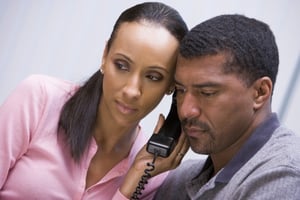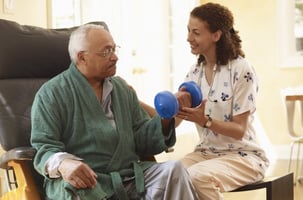Caring for an elderly loved one is difficult, especially when they live across the country. More...
Heat Safety Awareness
Every year, Americans endure high summer temperatures and many are at risk for serious health complications due to the heat. In order to maintain optimal health throughout the summer months, it is necessary to utilize education and prevention techniques to keep you and your loved ones safe.
An extreme heat and humidity condition consists of when temperatures are significantly higher than the average for a specific location and time of year. In some cases, heat disables the body’s ability to cool itself, causing internal body temperatures to rise and heat-related illnesses to occur.
Heat-related illnesses range from dehydration to heat stroke, requiring immediate medical attention. It is important that individuals are able to recognize common illnesses and identify necessary measures in the occurrence of each event.
Common Heat-Related Illnesses and Symptoms Include:
Heat Stroke. Symptoms include dizziness, confusion or altered mental state, fainting, seizures, excessive sweating or dry, hot skin, or high body temperatures. Heat stroke is a serious medical condition and requires immediate medical attention. While waiting for assistance, the individual should be moved into a cool area and have cool, wet clothes applied to their skin.
Heat Exhaustion. Symptoms include cool, moist skin, extreme sweating, dizziness or headache, weakness or light headedness, thirst or possible muscle cramps. The individual should sip water, be moved into a cool environment and have cool, wet cloths applied to their skin. If symptoms continue to worsen, seek immediate medical attention.
Heat Cramps. Symptoms include sweating, muscle spasms and pain usually in the abdomen, arms or legs. Firm pressure should be applied to cramping areas or gently massage to relieve a spasm. Individuals should move into a cool area, drink water and wait for pain/spasms to stop before returning to activities.
Heat Rash. Symptoms include clusters of red bumps on skin, often appearing on one’s neck, chest and in the folds of skin. Individuals should keep the affected area dry and stay in a cool environment until rashes begin to disappear.
Safety Tips to Prevent Heat-Related Illness:
1. Drink plenty of water. In order to keep our bodies cool, increase your fluid intake to prevent dehydration. Do not drink caffeinated or alcoholic beverages as they actually cause you to lose more fluids.
2. Slow down or rest often. Try to eliminate or reduce strenuous activities in high temperature environments. Infants and young children, seniors and those with serious health complications should stay in cooler areas whenever possible.
3. Dress appropriately. Wear lightweight, loose-fitting and light-colored clothing.
4. Protect yourself from the sun. Applying sun screen or wearing a hat may prevent your chances of burning. Sunburn reduces your body’s ability to fight off the heat.
5. Stay cool. Whether relocating to an air conditioned building or taking a cool shower, lowering your body’s temperature will help when it is time to return to extreme heat conditions.
If you have an elderly loved one or neighbor, help protect them during the summer months by watching for signs of heat exhaustion and encouraging them to increase their fluid intake. Check on elderly who may be at risk and notify a medical professional if assistance is needed.
Visiting Nurse Association of Ohio offers private-duty services for those who require monitoring or extra assistance with tasks of daily living. Services range from personal care assistance to skilled nursing care for those with health complications or concerns. Find out if you or your loved one may benefit from Home Assist™, private-duty services.
Call VNA of Ohio Today
Learn more about VNA of Ohio private-duty services, or call us today at 1-877-698-6264.



